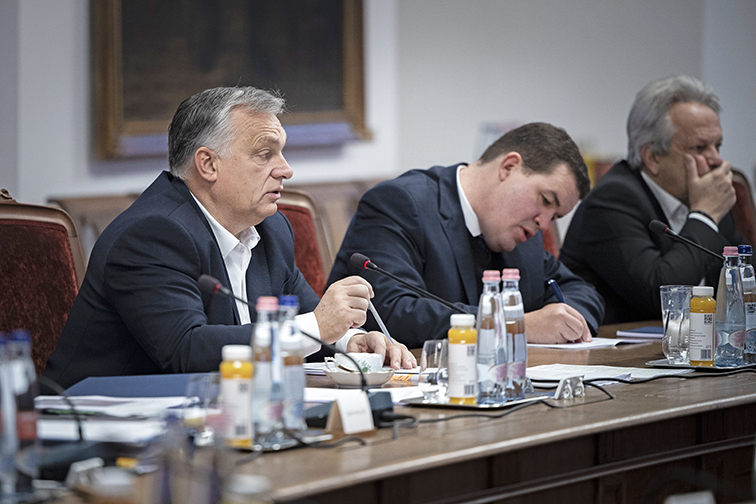Hungary Against Joint EU Loan for Ukraine

In the photo released by the Prime Minister’s Press Office, Prime Minister Viktor Orbán (left) chairs a government meeting in the office in the Carmelite Monastery on November 16. Next to him are State Secretary for Public Administration of the Prime Minister’s Government Office Gábor Bordás, and Parliamentary State Secretary of the Ministry of Defense Tamás Vargha. Thelatest developments of the Russo-Ukrainian war were assessed in detail at the government meeting, after a missile strike in Poland, andtheshut down of the Friendship oil pipeline due to a power outage caused by another missile attack.
Photo by Zoltán Fischer/Prime Minister’s Press Office/MTI.
Hungary will continue to support Ukraine financially, but disagrees with the European Union’s initiative of joint borrowing to do so, Minister of Finance Mihály Varga said following a meeting of EU finance ministers in Brussels on November 8.
Last month, the European Commission proposed a support package for Ukraine of up to EUR 18 billion for the whole of 2023, with monthly payments averaging EUR 1.5 bln. The EC said Ukrainian authorities and the International Monetary Fund (IMF) estimated that Ukraine needs roughly EUR 3 bln-4 bln a month to keep the state operating. This includes necessities like paying public wages and pensions and maintaining essential public services, such as hospitals, schools, and housing for relocated people.
To secure the funds for the loans, the Commission proposed borrowing on capital markets using a diversified funding strategy. Varga said the EU’s executive body is asking member states for a mandate to pursue this line of credit but also wants them to pay around EUR 630 million in related interest.
While Hungary is prepared to participate in preparing this sum, Varga said it does not support doing so on credit. He intimated that Hungary has a “bad experience” with joint EU loans since the country had still not seen any support from credit the EU utilized during the coronavirus crisis. Varga added that Hungary’s support for Ukraine included more than HUF 31 bln in funding and taking in one million-plus war refugees.
Minister of Foreign Affairs and Trade Péter Szijjártó similarly expressed his disagreement with the joint borrowing proposition at a meeting of foreign ministers of the Central European Initiative (CEI) in Sofia on November 7.
“We are ready to continue providing financial support based on a bilateral agreement between Ukraine and Hungary,” Szijjártó said, “but we will certainly not support any kind of joint European Union borrowing in this area.” He added that Hungary had been providing support for Ukraine, which had gone to healthcare, education, cultural institutions, and churches, even before the war.
‘Misconstrued’ Position
Shortly thereafter, Szijjártó felt the need to defend Hungary’s stance against various accusations. First, Szijjártó said that German Minister of Foreign Affairs Annalena Baerbock had “misconstrued” Hungary’s position on the EC’s joint borrowing initiative. He said that Germany’s foreign minister implied that Hungary was somehow utilizing this position as a negotiation tactic.
“Rejecting another joint European Union loan is not a tactical matter on our part, but a matter of principle,” Szijjártó explained.
Later, during a meeting of EU foreign ministers in Brussels on November 14, Szijjártó dismissed accusations that Hungary’s government had “adopted the Russian narrative” in its opposition to EU proposals.
“That is outrageous and must be rejected in the strongest terms,” Szijjártó declared. Stating that the government is “uninterested” in what the Russians or EU politicians think about their perspective, Szijjártó explained it was “interested in one thing, looking at every issue through the lens of our national interests.”
To this end, Szijjártó has said that the global energy crisis triggered by the war in Ukraine, and subsequent sanctions against Russia, required prioritizing domestic energy security. Consequently, Szijjártó wrote on his Facebook page on November 10 that the expansion of the Paks nuclear power plant is both a national strategic and national security interest for Hungary.
“Hungary is, to put it mildly, not rich in mineral resources, so in our case, nuclear energy will be able to ensure our independence,” he concluded.
This article was first published in the Budapest Business Journal print issue of November 18, 2022.
SUPPORT THE BUDAPEST BUSINESS JOURNAL
Producing journalism that is worthy of the name is a costly business. For 27 years, the publishers, editors and reporters of the Budapest Business Journal have striven to bring you business news that works, information that you can trust, that is factual, accurate and presented without fear or favor.
Newspaper organizations across the globe have struggled to find a business model that allows them to continue to excel, without compromising their ability to perform. Most recently, some have experimented with the idea of involving their most important stakeholders, their readers.
We would like to offer that same opportunity to our readers. We would like to invite you to help us deliver the quality business journalism you require. Hit our Support the BBJ button and you can choose the how much and how often you send us your contributions.








